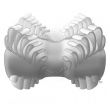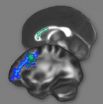(Press-News.org) Researchers at the University of Copenhagen have shown that 30 minutes of daily training provide an equally effective loss of weight and body mass as 60 minutes. Their results have just been published in the American Journal of Physiology.
Forty percent of Danish men are moderately overweight. For thirteen weeks, a research team at the Faculty of Medical and Health Sciences followed 60 heavy – but healthy – Danish men in their efforts to get into better shape. Half of the men were set to exercise for an hour a day, wearing a heart-rate monitor and calorie counter, while the second group only had to sweat for 30 minutes. Research results show that 30 minutes of exercise hard enough to produce a sweat is enough to turn the tide on an unhealthy body mass index:
– On average, the men who exercised 30 minutes a day lost 3.6 kilo in three months, while those who exercised for a whole hour only lost 2.7 kg. The reduction in body mass was about 4 kg for both groups, reports Mads Rosenkilde, PhD student, Department of Biomedical Sciences.
30 minutes of exercise training provide an extra bonus:
– Participants exercising 30 minutes per day burned more calories than they should relative to the training program we set for them. In fact we can see that exercising for a whole hour instead of a half does not provide any additional loss in either body weight or fat. The men who exercised the most lost too little relative to the energy they burned by running, biking or rowing. 30 minutes of concentrated exercise give equally good results on the scale, explains Mads Rosenkilde.
Motivation to exercise
Mads Rosenkilde postulates that some of the explanation for the surprising results is that 30 minutes of exercise is so doable that participants in the study had the desire and energy for even more physical activity after their daily exercise session. In addition, the study group that spent 60 minutes on the treadmill probably ate more, and therefore lost slightly less weight than anticipated.
– The participants in our study trained every day for three months. All training sessions were planned to produce a light sweat, but participants were expected to increase the intensity and give it gas three times a week, explains Mads Rosenkilde. He is also surprised at the research results, and the goal now is to study the effects of other types of exercise:
– Another interesting scenario is to study exercise as a form of transport. Training is fantastic for your physical and mental health. The problem is that it takes time. If we can get people to exercise along the way – to work, for example – we will have won half the battle, says Mads Rosenkilde.
On the right wavelength
The research results are unique, because participants in the study belong to the large but often overlooked group of moderately overweight men, who have gradually become 40% of the male population in Denmark.
Participants in the study wanted a lifestyle change with the help of exercise training, and in the period of the study, they were followed closely by health science researchers with focus on energy balance, insulin resistance and hormones in the blood. Ethnologists also took part in order to uncover the cultural barriers involved in training and changing well entrenched habits.
The broad interdisciplinary approach of the FINE project – a Danish acronym for Physical Activity for a Long Healthy Life – (link) has generated extremely strong data. Very few research subjects dropped out, because of the focus on participants' motivation to exercise, both early on – and during – the process:
– We have really been on the same wavelength as our research subjects – and the FINE study covered all aspects of training, both physical and psychological, concludes Mads Rosenkilde.
###
Facts:
Read the article in The American Journal of Physiology: http://ajpregu.physiology.org/content/early/2012/07/30/ajpregu.00141.2012.abstract
Facts: A long life
The FINE project was an interdisciplinary collaboration among researchers from three faculties at the University of Copenhagen and two hospitals in Greater Copenhagen. In time, the knowledge gained by the project can prove significant for diagnostics and therapy in connection with preventing and treating lifestyle diseases and can lead to the development of better drugs.
The FINE project received financial support from the UNIK initiative Food, Fitness & Pharma, the Novo Nordisk Foundation and the Center for Healthy Aging at the Faculty of Medical and Health Sciences at the University of Copenhagen.
Facts:The study in numbers
Weight loss was 3.6 kilo for research subjects who exercised 30 minutes daily for three months and 2.7 kg for those who exercised a whole hour. Reduction in body mass was approximately 4 kg for both groups.
30 minutes of daily exercise does the trick
2012-08-22
ELSE PRESS RELEASES FROM THIS DATE:
Income, 'screen time' affect soda, junk food consumption
2012-08-22
(Edmonton) Preschoolers from low-income neighbourhoods and kids who spend more than two hours a day in front of a TV or video-game console have at least one thing in common: a thirst for sugary soda and juice, according to research from the University of Alberta.
Researchers from the faculties of Physical Education and Recreation, School of Public Health and Medicine & Dentistry surveyed parents to assess the dietary habits of 1,800 preschoolers in the Edmonton region as part of a larger study on diet, physical activity and obesity.
Researchers found that 54.5 per cent ...
Likely voters say president's 'first 100 days in office' should include plans for research
2012-08-22
WASHINGTON—August 22, 2012— On the eve of the political conventions, nearly two-thirds of likely voters say the next president should announce initiatives promoting medical progress during his "first 100 days in office," according to a new national public opinion poll commissioned by Research!America. And nearly three-quarters of those polled say it's important for candidates for the presidency and Congress to have a science advisor. The findings reveal deep concerns among voters about the lack of attention candidates and elected officials have assigned to research.
"Research ...
Ames Laboratory scientists crack long-standing chemistry mystery
2012-08-22
A team of researchers at the U.S. Department of Energy's (DOE's) Ames Laboratory has answered a key question concerning the widely-used Fenton reaction – important in wastewater treatment to destroy hazardous organic chemicals and decontaminate bacterial pathogens and in industrial chemical production. The naturally occurring reaction was first discovered in 1894 by H.J.H. Fenton, a British chemist at Cambridge, and involves hydrogen peroxide (H2O2) and iron.
How the Fenton reaction actually happens has remained in contention. Scientists have long debated whether it ...
Ancient fossils reveal how the mollusc got its teeth
2012-08-22
TORONTO, ON – The radula sounds like something from a horror movie – a conveyor belt lined with hundreds of rows of interlocking teeth. In fact, radulas are found in the mouths of most molluscs, from the giant squid to the garden snail. Now, a "prototype" radula found in 500-million-year-old fossils studied by University of Toronto graduate student Martin Smith, shows that the earliest radula was not a flesh-rasping terror, but a tool for humbly scooping food from the muddy sea floor.
The Cambrian animals Odontogriphus and Wiwaxia might not have been much to look at ...
UCI microbiologists find new approach to fighting viral illnesses
2012-08-22
Irvine, Calif., Aug. 22, 2012 — By discovering how certain viruses use their host cells to replicate, UC Irvine microbiologists have identified a new approach to the development of universal treatments for viral illnesses such as meningitis, encephalitis, hepatitis and possibly the common cold.
The UCI researchers, working with Dutch colleagues, found that certain RNA viruses hijack a key DNA repair activity of human cells to produce the genetic material necessary for them to multiply.
For many years, scientists have known that viruses rely on functions provided by ...
Australian general practitioners in training spend less time with peds patients than with adults
2012-08-22
Ann Arbor, Mich. — Australian doctors-in-training spend significantly less time consulting with pediatric patients than they do with adults, according to a new study published in the journal Australian Family Physician.
The study found that the proportion of longer consultations – more than 20 minutes -- for children was significantly less than that for adults and seniors among general practice registrars, says Gary Freed, M.D., M.P.H., the lead author on the study and Australian-American health policy fellow, Australian Health Workforce Institute at the University of ...
Close contact with young people at risk of suicide has no effect
2012-08-22
Researchers, doctors and patients tend to agree that during the high-risk period after an attempted suicide, the treatment of choice is close contact, follow-up and personal interaction in order to prevent a tragic repeat. Now, however, new research shows that this strategy does not work. These surprising results from Mental Health Services in the Capital Region of Denmark and the University of Copenhagen have just been published in the British Medical Journal.
Researchers from Mental Health Services in the Capital Region of Denmark and the University of Copenhagen have ...
Rewired visual input to sound-processing part of the brain leads to compromised hearing
2012-08-22
ATLANTA – Scientists at Georgia State University have found that the ability to hear is lessened when, as a result of injury, a region of the brain responsible for processing sounds receives both visual and auditory inputs.
Yu-Ting Mao, a former graduate student under Sarah L. Pallas, professor of neuroscience, explored how the brain's ability to change, or neuroplasticity, affected the brain's ability to process sounds when both visual and auditory information is sent to the auditory thalamus.
The study was published in the Journal of Neuroscience.
The auditory thalamus ...
Intense prep for law school admission test alters brain structure
2012-08-22
Intensive preparation for the Law School Admission Test (LSAT) actually changes the microscopic structure of the brain, physically bolstering the connections between areas of the brain important for reasoning, according to neuroscientists at the University of California, Berkeley.
The results suggest that training people in reasoning skills – the main focus of LSAT prep courses – can reinforce the brain's circuits involved in thinking and reasoning and could even up people's IQ scores.
"The fact that performance on the LSAT can be improved with practice is not new. ...
Study shows long-term effects of radiation in pediatric cancer patients
2012-08-22
For many pediatric cancer patients, total body irradiation (TBI) is a necessary part of treatment during bone marrow transplant– it's a key component of long term survival. But lengthened survival creates the ability to notice long term effects of radiation as these youngest cancer patients age. A University of Colorado Cancer Center study recently published in the journal Pediatric Blood & Cancer details these late effects of radiation.
"These kids basically lie on a table and truly do get radiation from head to toe. There is a little blocking of the lungs, but nothing ...


